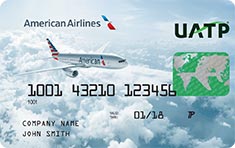Founded in 1936 by American Airlines, Universal Air Travel Plan (UATP) is the oldest payment scheme globally. According to Raph Kaiser, the president, chairman, and CEO of UATP, all cards of UATP begin with number 1 since they were the first cards to be given 83 years ago. But UATP is still a product that is hugely invisible. Millions of consumers probably have never heard about UATP, and their wallets do not have the UATP card. This is because of the design according to Kaiser since UATP is a payment platform based on B2B. This gives a few of consumers the right to touch it practically.
The other significant group that might not have heard of it also is the corporate drivers which are the market that UATP hugely serves. The law requires that if they work at a large partnership with a dedicated travel agent of corporate, they should have booked and paid for a ticket by the use of rails of UATP. Kaiser added that it is not easy to estimate the global air travel market. However, UATP estimates that it has the control of around 15% of the market under its rails. Despite it being based in the US, 80% of its operations are global especially in Europe, and there is an increase in its Chinese operations. Corporate travelers are not senseless clients of UATP. For instance, consumers who have used PayPal to buy tickets will have the payment processes to UATP without them being aware.
The payment scheme has gone through a lot since its launch in 1936. According to Kaiser, they have significantly changed from being a group inside a business to being a real card network that optimizes payment solutions for all of its airline communities. Moreover, being the oldest firm, the company has fully focused on being very innovative in the past ten years. The firm has worked to be a firm that is flexible, nimble and make changes quickly. The changes have focused on the airline sector, its outstanding system of payment and sourcing for the needs of shareholders, where the setbacks are and what the system can solve out for them. According to Kaiser, airlines are a different sector especially when it gets to payments. All of them are truly global ventures, for instance, US Delta is the same as the Delta in Europe irrespective of the place of the takeoff and landing. Generally, airlines are single corporate banners that fly in various locations globally.
The sector has a unique payment requirement because airlines fly globally and transact in many locations in many currencies every day. It has its system where settlement and processing take place between all airlines sector players worldwide once every week. The UATP network does not move the money directly. It is the provider of data to the clearing center and operates the card network for its member airlines. Kaiser said that in their system, the issuers and acquirers are the airlines and they operate the network and own the contracts of merchants. She added that UATP is a different model from the three and four party models that currently characterize the payments sector. Just like issues, airlines are allowed to give their cards according to their wish within the network rules to suit the needs of their corporate clients. They can give single lodge cards on which companies can book their corporate travel arrangements or give individual corporate cards to every single member of a corporate client’s employee base. UATP was designed specifically for and by the airline sector. The main aim is to give the sector a way to directly work with its corporate travel sales targets since the travelers are generally the most valuable in the market.
Currently, the network has 26 airlines that are UATP issuers, but UATP is testing a program that will allow the travel management firms also to give cards. Airlines that give UATP payment accounts to their corporate clients get favorable economics for accepting the payments and use them to develop designed offers for their corporate clients. Common offerings according to Kaiser include low rates on certain flights once corporate clients books a given volume of flight and pays through their UATP account. The better rates quickly add up especially for companies that book many travels. Firms that spend $100 million annually on airfare probably want to ensure that they are getting the best possible deal they can. This is since even 1% or 2% saving is a significant value for a shareholder. According to Kaiser, even though the smallest business does not have the reason to have UATP services, well-established middle-market businesses are usually served well by UATP. This is because it offers a direct link to the best rates that are offered by airlines.
Despite being based on B2B corporate travel payments network, UATP has been working behind the curtains for many years the improve the payment lives of corporate consumers all across the globe. This makes it easier for airlines to accept regional, local and alternative modes of payments that consumers may require to book flights. Payments made using iDEAL in Netherlands, Alipay, and PayPal are usually processed over the payment network of UATP. According to Kaiser, UATP is adding point-of-sale (POS) to the definition of alternative payments. He gave an example of a family of four flying to Paris needs to pay $4,000 in airfare economy with tickets bought in advance. Many families cannot afford that amount of money but can manage to pay it using 18 months installments. The mode of payment will drive incremental sales to airlines apart from being seen as a substitute method of payment. The purchase of airline tickets can reach the purchase of washing machines.
Europe is the largest market of UATP, but its Chinese growth has been stronger. Kaiser said that there are four issuers in China and 25 airlines are taking UATP. Furthermore, UATP is working on putting up India today which might be bigger than China. Kaiser thinks that African airline market remains underserved and ready for development.



